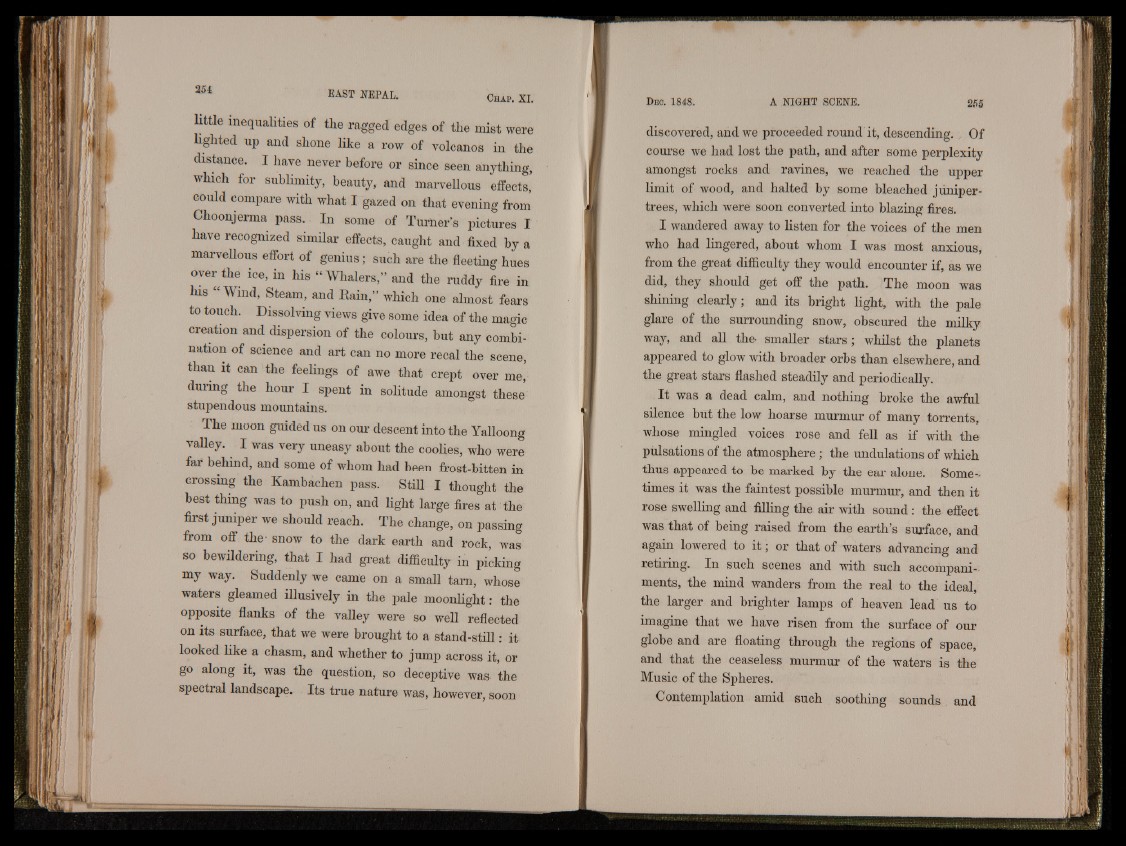
little inequalities of the ragged edges of the mist were
lighted up and shone like a row of volcanos in the
distance. I have never before or since seen anything,
which for sublimity, beauty, and marvellous effects,
could compare with what I gazed on that evening from
Choonjerma pass. In some of Turner’s pictures I
have recognized similar effects, caught and fixed by a
marvellous effort of genius; such are the fleeting hues
over the ice, in his “ Whalers,” and the ruddy fire in
Ins “ Wind, Steam, and Eain,” which one almost fears
to touch. Dissolving views give some idea of the magic
creation and dispersion of the colours, but any combination
of science and art can no more recal the scene,
than it can the feelings of awe that crept over me,
during the hour I spent in solitude amongst these
stupendous mountains.
The moon guided us on our descent into the Yalloong
valley. I was very uneasy about the coolies, who were
far behind, and some of whom had been frost-bitten in
crossing the Kambachen pass. Still I thought the
best thing was to push on, and light large fires at the
first juniper we should reach. The change, on passing
from off the- snow to the dark earth and rock, was
so bewildering, that I had great difficulty in picking
my way. Suddenly we came on a small tarn, whose
waters gleamed illusively in the pale moonlight: the
opposite flanks of the valley were so well reflected
on its surface, that we were brought to a stand-still: it
looked like a chasm, and whether to jump across it, or
go along it, was the question, so deceptive was the
spectral landscape. Its true nature was, however, soon
discovered, and we proceeded round it, descending. Of
course we had lost the path, and after some perplexity
amongst rocks and ravines, we reached the upper
limit of wood, and halted by some bleached juniper-
trees, which were soon converted into blazing fires.
I wandered away to listen for the voices of the men
who had lingered, about whom I was most anxious,
from the great difficulty they would encounter if, as we
did, they should get off the path. The moon was
shining clearly; and its bright light, with the pale
glare of the surrounding snow, obscured the milky
way, and all the- smaller stars; whilst the planets
appeared to glow with broader orbs than elsewhere, and
the great stars flashed steadily and periodically.
I t was a dead calm, and nothing broke the awful
silence but the low hoarse murmur of many torrents,
whose mingled voices rose and fell as if with the
pulsations of the atmosphere ; the undulations of which
thus appeared to be marked by the ear alone. Sometimes
it was the faintest possible murmur, and then it
rose swelling and filling the air with sound: the effect
was that of being raised from the earth’s surface, and
again lowered to i t ; or that of waters advancing and
retiring. In such scenes and with such accompaniments,
the mind wanders from the real to the ideal,
the larger and brighter lamps of heaven lead us to
imagine that we have risen from the surface of our
globe and are floating through the regions of space,
and that the ceaseless murmur of the waters is the
Music of the Spheres.
Contemplation amid such soothing sounds and